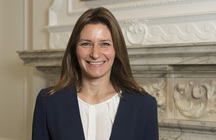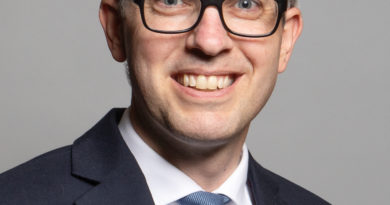Lucy Frazer – 2022 Speech to the Joint Chiefs of Global Tax Enforcement (J5) Summit
The speech made by Lucy Frazer, the Financial Secretary to the Treasury, on 17 May 2022.
Introduction
A very good afternoon, everyone.
It’s brilliant to see so many of you here in London… together in person for the first time, I believe, since Sydney 2020.
I also want to extend a warm welcome to the Chiefs of Global Tax Enforcement and their teams of experts. And to the many delegates from international industry partners and the Wolfsburg Group who are joining throughout the week.
On behalf of the UK government, let me say that we’re delighted to host this summit, and absolutely committed to our role as a founding member of the J5.
It’s a ground-breaking alliance, which is doing things in ways that haven’t been tried before. And truly making ‘the world a smaller place for tax criminals’.
Understanding the threat
The UK, for its part, is taking action on tax crime hard and fast.
Giving HM Revenue and Customs a range of new asset recovery and ‘proceeds of crime’ powers.
Introducing a ground-breaking ‘failure to prevent’ piece of legislation, which means that HMRC now has several corporations under live criminal investigation.
And adopting a tougher stance on offshore evasion.
But tax fraud is a perennial and persistent threat to all our nations.
And unity, transparency and collaboration will be essential if we’re to tackle it.
Because, put simply, tax cheats flourish when we fail to work together.
And every scrap of information left behind by fraudsters – in any one of our jurisdictions – is a potential lead in the fight against global tax crime.
By joining forces, we undermine the global criminal community in ways we could not do alone.
So, this conference isn’t just a great opportunity to celebrate everything we’ve already achieved together.
It’s also a chance to share ideas and expertise. To renew our collective ambition. And to design and develop the next steps in this crucial fight.
The speed of change
I was appointed Financial Secretary to the Treasury last September, with international tax policy as an important part of my portfolio.
Since then, I’ve learned a great deal.
In particular, I’ve been struck by the furious speed at which tax fraud evolves.
Fraud is becoming ever more complex and international. And in some ways that’s a compliment to all of the J5 partners.
It’s not easy to commit tax fraud and get away with it.
But as we’ve closed the net, criminals have upped their game.
Evaders are using increasingly complex and diverse structures to avoid detection.
Money launderers are using complex multi-jurisdictional transaction chains to hide transactions.
And organised criminals are using and abusing complex corporate structures to mask the top-tier criminals masterminding the fraud.
We’ve seen the movement of money and capital become increasingly fluid as historical, physical and geographical barriers to trade have slipped away.
The rise of the ‘global citizen’ means that tax criminals may be based in one country, but have trusts and bank accounts scattered across many others.
Of course, it’s not easy for a criminal to set up such an intricate web alone.
And this is a crucial point.
The UK’s HMRC team tell me they’re increasingly seeing criminals harnessing professional help, direction and support – particularly in cases involving offshore entities.
In other words, it’s not just the role of the fraudster that’s evolving… it’s also that of the enabler.
A crime with victims
Of course, perhaps due to its complex nature. tax fraud is sometimes perceived as something of a victimless crime.
But that’s simply not the case.
The damage can be hard to visualise – especially when those directly involved in supply chain fraud or importing illicit goods are operating thousands of miles away, hidden behind complex webs of corporate structures or criminal enablers…
But it’s all too stark for the retiree who discovers too late that their tax, national insurance or workplace pension contributions have been fraudulently redirected by a payroll company. And that they can no longer afford the life they have worked so hard to build.
Or for the teenager trafficked to a foreign country to work in illicit factories manufacturing tobacco products, funded by the fraudulent activity of organised criminal gangs.
The emotional and financial costs can be lifechanging.
The impacts of tax crime can filter through into wider society.
Associated profits are used to fund other sorts of crime in our communities, giving criminals the financial means to corrupt and exert their power at home.
And while fraud is hugely damaging to its direct and indirect victims, it also ruins the lives of its perpetrators and their families. What a waste.
International co-operation
A big part of the solution, as I say, is international cooperation.
We’ve already shown it can be done.
Last year, here in London, we saw the G7 strike a game-changing agreement on global tax reform. Ensuring large multinationals pay tax of at least 15% on their profits. And reforming taxation rules to ensure a greater share of multinationals’ profit is taxed in the countries in which their customers are located.
The J5 too has made some notable steps forward.
I was particularly excited to hear about ‘The Challenge’ held last March – an event which brought together investigators, experts and data scientists to track down fraudsters using cryptocurrency to facilitate tax crimes.
Very far from a ‘talking shop’, ‘The Challenge’ led to real action. Including the identification of a number of suspect companies in each J5 nation.
Another example of the J5’s success is the arrest and charging of 10 individuals involved in a years-long, multimillion dollar investment and impersonation scheme.
The defendants were able to defraud millions of dollars from individuals across the globe.
They were operating across multiple countries, impersonating respected investment firms, producing fake documents and hiding behind fabricated identities.
But it was thanks to collaboration between J5 members that we were able to piece together the jigsaw of evidence scattered around the globe.
We cannot be complacent
We should be proud of what we’ve achieved together. Of course we should.
But this is no time to be complacent.
During the pandemic, we saw an increase in fraudsters identifying and exploiting new and essential products developed in the fight against Covid-19.
We must be alert not just to what criminals are doing now, but ahead of them in thinking what might be possible in the future.
Here in the UK, we continue to take steps to tackle tax fraud and evasion.
We’ve introduced an additional 20 measures since last year – and are forecast to raise an estimated £6.3 billion over the next 5 years.
There’s also ‘Making Tax Digital’, our pioneering new way for businesses to keep their tax records in a modern, digital, fit-for-purpose system.
It’s improving efficiency, accuracy and transparency in our tax system. And removing the opportunity for fraudsters to exploit systems built for a different age.
The UK Government has also recently provided almost £300 million for HMRC to invest in additional support across all forms of compliance activity.
We’ve invested in HMRC’s illicit finances capability, to tackle the enablers of serious fraud, focusing on the illicit financial transactions that underpin tax crime.
This increased capacity for tackling tax crime at home can only bolster the data and technological capabilities we can share with our J5 partners.
In addition, the UK continues to spearhead the Common Reporting Standard, which provides greater transparency through the automatic exchange of taxpayer account information.
I’m delighted that more than 100 jurisdictions have signed up to the CRS.
This means that fraudsters in these jurisdictions can no longer benefit from secrecy rules used to hide transactions that would otherwise be flagged as a cause for concern.
Indeed, this significant increase in global transparency has seen HMRC bring in more than £500 million to date, directly through Automatic Exchange Agreements such as the Common Reporting Standard.
It’s also encouraging to see new important developments that increase international tax transparency, and reduce the scope for hiding assets and profits, even more.
The UK is the first major economy to commit to the OECD’s new Mandatory Disclosure Rules. These require disclosure of arrangements designed to avoid CRS reporting or hide the beneficial ownership of assets.
The UK is also committed to the new OECD Model Rules for Digital Platforms that require the reporting of sales on internet platforms. And we welcome the development of the Crypto-Asset Reporting Framework, another significant new transparency initiative.
Public-Private collaboration
The State, of course, is integral to tackling tax crime. And we can do a lot.
But for reforms to be successful and long-lasting, they need to be made in conjunction with the private sector.
Governments can work to regulate or provide guidance, but it’s ultimately the private sector that determines who can access the financial system.
The private sector also plays a huge role in funding the mechanisms used to fight economic crime. By investing in sophisticated new technologies that undertake transactional risking and protect consumers from fraud. As well as ensuring that their operating models comply with reporting requirements.
For all those reasons, we‘ve invested in these partnerships – expanding our capability in intelligence flows, risk alerts and behavioural insight. And they are already paying dividends.
Cooperation between HMRC and the private sector recently meant we were able to work together to prevent losses of more than £50 million following a systematic attack on our Self-Assessment taxation system.
I know that cooperation is being replicated across the J5. And I’m really excited to see what’s achieved as a result.
Conclusion
Ladies and Gentlemen,
Taxation relies on trust.
Trust between a Government and its citizens that rates will be set fairly and transparently.
And trust that individuals and businesses will be held accountable if they fail to pay what is due.
Tax crime undermines that trust.
But everything you do – that we do together – restores it.
We can – and we must – continue doing everything we can… to collaborate, to innovate, and to eliminate the loopholes criminals seek to exploit.
Henry Ford, the great American industrialist, once said that “Coming together is a beginning. Keeping together is progress. Working together is success.”
Well, we’ve already ‘come together’… through the J5.
This week will help us ‘keep together’… showing our joint commitment to make progress in the fight against global tax crime and showing tax criminals that our resolve is unwavering.
And, in the months and years ahead, we must continue to ‘work together’.
Because the importance of this… for our economies… for our societies… means we cannot do anything less.
Thank you very much.



